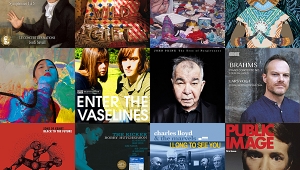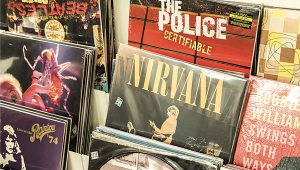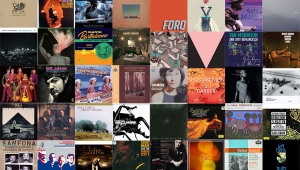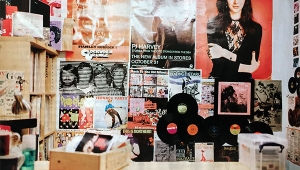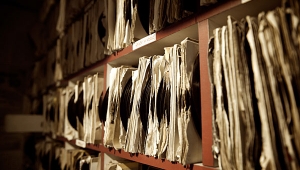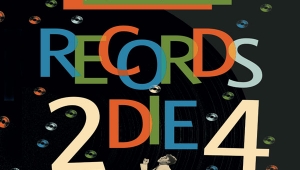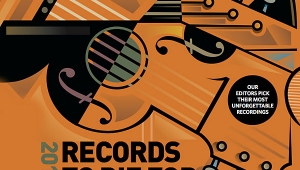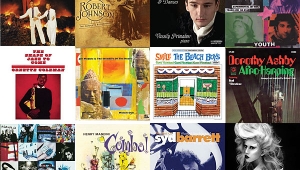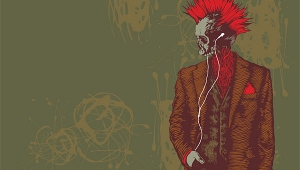| Columns Retired Columns & Blogs |
1997 Records To Die For Page 2
Larry Archibald
LIKE AS A HART: Psalms & Spiritual Songs
Joseph Flummerfelt, Westminster Choir College of Rider University
Chesky CD138 (CD only). 1996. David Chesky, prod.; Norman Chesky, exec. prod.; Bob Katz, eng. DDD. TT: 75:01
I'm not generally one to recommend records from audiophile labels. To some extent that's because audiophile releases get a lot of attention in these pages without my contributions---but it's also because most audiophile CDs fail to capture my interest. I wouldn't go so far as JGH---"the better the recording, the worse the performance"---but I just don't find myself turning over and over again to most audiophile releases.
JOHN LEE HOOKER: Don't Turn Me from Your Door: John Lee Hooker Sings His Blues
John Lee Hooker, vocals, guitar; Eddie Kirkland, vocals, guitar; bassist unknown
Atco 82365-2 (CD only). 1962. Henry Stone, prod.; Stephen Innocenzi, digital remastering. ??? TT: 43:35
I couldn't figure out why I liked this disc so much until I began reading the liner notes for this writeup---originally recorded in 1953, released on LP by Atco (Atco 33-151) in 1962, then later by Atlantic (Atlantic 7228) as Detroit Special. Does this mean it might be mono? Well, possibly, but it sounds just as good with your preamp set for stereo.
NIRVANA: In Utero
Geffen DGC/DGCD-24607 (LP/CD). 1993. Steve Albini, Bob Weston, prods.; Scott Litt, eng. AAA/AAD. TT: 41:23
He ate oranges with the skins on. He named his daughter Bean 'cause that's what she looked like in a sonogram. He spelled his name Kurdt, Kurt, Curt. He is the lost poet of In Utero.
COUNTING CROWS: August and Everything After
Geffen DGCD-24528 (CD only). 1993. T-Bone Burnett, prod.; Paul McCarthy, eng. AAD. TT: 51:47
Said to reflect Adam's Duritz's life since birth, August and Everything After speaks of the circles of life ("Omaha"), of excess ("Rain King") and loneliness ("Time and Time Again") and living with memories ("Ghost Train"). Each time I listen my soul wanders through the desolate plains and dances into Adam's words of wanting, of waiting, of being.
NATHANIEL ROSEN: Reverie: Romantic Music for Quiet Times
Works by Satie, Fauré, Brahms, Elgar, Debussy, Rachmaninoff, etc.
Nathaniel Rosen, cello; Doris Stevenson, piano; with Arturo Delmoni, violin, and Kaaren Erickson, soprano
John Marks JMR 10 (CD only). 1996. John Marks, Arturo Delmoni, prods.; Jerry Bruck, eng.; Michael Karas, asst. eng.; Bob Ludwig, mastering eng. DDD. TT: 68:20
As I approach 50, I find that pure beauty of sound alone no longer does it for me when it comes to the music I turn to in the solitude of my listening room. String quartets, solo piano pieces, and cerebral pieces like Bach's Art of the Fugue increasingly find their way on to the Levinson No.31 or the Sondek LP12. It is some surprise, therefore, that the first one of my 1997 picks qualifies on terms of sonic beauty. This 1996 collection of transcriptions from the classical repertoire features that most vocal of instruments, the cello, lovingly caressed by "Nick" Rosen (even if he does take the first Satie Gymnopedie a little too athletically for my taste), occasionally joined by violin and soprano.
DVORÁK: Romance
MASSENET: Meditation from Thaïs
MENDELSSOHN: Violin Concerto
VAUGHAN WILLIAMS: The Lark Ascending
Anne Akiko Meyers, violin; Andrew Litton, Philharmonia Orchestra
RCA 61700-2 (CD only). 1993. David Frost, prod.; Tony Faulkner, eng.; Bob Rapley, editor; Michael Dutton, technical advisor. DDD. TT: 58:37
Too often the typical classical recording is, in the phrase used to describe Oscar Wilde, "a butterfly pinned to a wheel." While the dead object is still in some macro sense the same as it was when it was alive, the essential beauty associated with its living vitality has always been dissipated, most often destroyed. But with this outstanding 1993 CD of some of the most beautiful pieces written for violin and orchestra, recorded in London's Henry Wood Hall by legendary English engineer Tony Faulkner and noiseshaped to 16-bit resolution with the Meridian 618 processor, the butterfly still takes breath. Though in absolute terms the soloist is a little too forward-balanced, the orchestra peeking around her shoulders, the lush sound is otherwise deliciously true to reality, and captures that necessary fragility of the real thing.
LIKE AS A HART: Psalms & Spiritual Songs
Joseph Flummerfelt, Westminster Choir College of Rider University
Chesky CD138 (CD only). 1996. David Chesky, prod.; Norman Chesky, exec. prod.; Bob Katz, eng. DDD. TT: 75:01
I'm not generally one to recommend records from audiophile labels. To some extent that's because audiophile releases get a lot of attention in these pages without my contributions---but it's also because most audiophile CDs fail to capture my interest. I wouldn't go so far as JGH---"the better the recording, the worse the performance"---but I just don't find myself turning over and over again to most audiophile releases.
Like as a Hart, from Chesky, is different. It consists of 17 pieces of choral religious music of tremendous variety, starting off with Sicut Cervut, a Palestrina piece I once sang myself (for personal rather than artistic edification) and ending with Antiphon, by Vaughan Williams. Two more different pieces could hardly be imagined, which is characteristic of the entire disc. Palestrina is intimate and confessional, Vaughan Williams proclamational and ecstatic (with a great organ thrown in).
Sonics, as typical with Chesky, are excellent. The performances vary from ethereal to exciting. The liner notes provided, however, are more to die from than for. No information is provided about any of the 15 different composers, nor are any dates provided for the individual works, thereby missing an easy opportunity for a short course in the history of religious music. Too bad---but not so bad as to keep you from relishing this disc.
JOHN LEE HOOKER: Don't Turn Me from Your Door: John Lee Hooker Sings His Blues
John Lee Hooker, vocals, guitar; Eddie Kirkland, vocals, guitar; bassist unknown
Atco 82365-2 (CD only). 1962. Henry Stone, prod.; Stephen Innocenzi, digital remastering. ??? TT: 43:35
I couldn't figure out why I liked this disc so much until I began reading the liner notes for this writeup---originally recorded in 1953, released on LP by Atco (Atco 33-151) in 1962, then later by Atlantic (Atlantic 7228) as Detroit Special. Does this mean it might be mono? Well, possibly, but it sounds just as good with your preamp set for stereo.
John Lee is a great artist, and this disc captures him at a time when his raw energy was at its most virulent. He was born in Clarksdale, Mississippi, a part of the Mississippi Delta I lived real near for about a year back in 1964. It is an exceedingly tough part of the country, particularly during the time John Lee lived there. I could call attention to favorite songs, but there's not much point---the whole disc is a blues meditation in which pain is nuanced through both vocal and guitar inflection. Sound quality is good to excellent, with few apologies needed for the early recording date.
I would have liked to have recommended Black Snake (Fantasy F-24722), a Hooker double LP originally recorded in 1959 and 1960 and released on Riverside 838 and 321, but I don't think it's available on CD. It comes closer to the evil side of Hooker---truly scary. Four great sides of Hooker, if you can find it, with even better sound quality than Don't Turn Me from Your Door. It may even be in stereo, not that it matters. ![]()
Lisa Astor
NIRVANA: In Utero
Geffen DGC/DGCD-24607 (LP/CD). 1993. Steve Albini, Bob Weston, prods.; Scott Litt, eng. AAA/AAD. TT: 41:23
He ate oranges with the skins on. He named his daughter Bean 'cause that's what she looked like in a sonogram. He spelled his name Kurdt, Kurt, Curt. He is the lost poet of In Utero.
Wrapped in an album cover wielding symbols of resurrection, new life, and death, In Utero captures the dichotomy of the pain of life and pleasure. Recorded in two weeks, it was first called I hate myself and want to die then verse-chorus-verse. Sonically, the CD is harsh and compressed; the LP is better.
The rumblings from the "pit of his burning nauseous stomach" flood me and leave me empty. The dumping of so much raw emotion in the guttural moans of man and guitar in "Scentless Apprentice" makes my heart race. I get caught in the charging pulse of "Rape Me" and the release of gray light in "Dumb." Here there are no melodies to lie to you; only sounds of peace, empathy, and love. (XVII-1, 2)
COUNTING CROWS: August and Everything After
Geffen DGCD-24528 (CD only). 1993. T-Bone Burnett, prod.; Paul McCarthy, eng. AAD. TT: 51:47
Said to reflect Adam's Duritz's life since birth, August and Everything After speaks of the circles of life ("Omaha"), of excess ("Rain King") and loneliness ("Time and Time Again") and living with memories ("Ghost Train"). Each time I listen my soul wanders through the desolate plains and dances into Adam's words of wanting, of waiting, of being.
At the suggestion of Robbie Robertson, Counting Crows recorded at a house where they lived together. It created an interplay in the music, a comfortable assurance. You can feel them grooving off each other. The poetic lyrics, reminiscent of T.S. Eliot's Four Quartets, are delivered with the honesty of illusion and disillusion. Listening is like being wrapped in a warm fog. ![]()
John Atkinson
NATHANIEL ROSEN: Reverie: Romantic Music for Quiet Times
Works by Satie, Fauré, Brahms, Elgar, Debussy, Rachmaninoff, etc.
Nathaniel Rosen, cello; Doris Stevenson, piano; with Arturo Delmoni, violin, and Kaaren Erickson, soprano
John Marks JMR 10 (CD only). 1996. John Marks, Arturo Delmoni, prods.; Jerry Bruck, eng.; Michael Karas, asst. eng.; Bob Ludwig, mastering eng. DDD. TT: 68:20
As I approach 50, I find that pure beauty of sound alone no longer does it for me when it comes to the music I turn to in the solitude of my listening room. String quartets, solo piano pieces, and cerebral pieces like Bach's Art of the Fugue increasingly find their way on to the Levinson No.31 or the Sondek LP12. It is some surprise, therefore, that the first one of my 1997 picks qualifies on terms of sonic beauty. This 1996 collection of transcriptions from the classical repertoire features that most vocal of instruments, the cello, lovingly caressed by "Nick" Rosen (even if he does take the first Satie Gymnopedie a little too athletically for my taste), occasionally joined by violin and soprano.
The booklet notes state that Reverie was recorded with a Schoeps "Sphere" stereo microphone and a Nagra-D by that canny master, Jerry Bruck. However, in Jonathan Scull's interview with Rosen, Marks, and Bruck in the January '97 Stereophile, it was stated that four microphones were used to capture the soundfield. Whatever, the sound of Rosen's 1738 Domenico Montagna instrument is robust yet not too forward, vibrant yet not over-aggressive, and set within the luminous acoustic of the large Recital Hall of the Performing Arts Center at Purchase College, SUNY. The piano is positioned farther back within the soundstage, yet is not too reverberant-sounding and has its full measure of body.
There is always the danger with this repertoire that it could be confused with salon music. That is definitely not the case here. In that January interview, Rosen quoted his teacher Gregor Piatigorsky as saying, "I have made a vow that I will never play one uninspired note in a recording studio." I can vouch that there are no uninspired notes on this disc!
DVORÁK: Romance
MASSENET: Meditation from Thaïs
MENDELSSOHN: Violin Concerto
VAUGHAN WILLIAMS: The Lark Ascending
Anne Akiko Meyers, violin; Andrew Litton, Philharmonia Orchestra
RCA 61700-2 (CD only). 1993. David Frost, prod.; Tony Faulkner, eng.; Bob Rapley, editor; Michael Dutton, technical advisor. DDD. TT: 58:37
Too often the typical classical recording is, in the phrase used to describe Oscar Wilde, "a butterfly pinned to a wheel." While the dead object is still in some macro sense the same as it was when it was alive, the essential beauty associated with its living vitality has always been dissipated, most often destroyed. But with this outstanding 1993 CD of some of the most beautiful pieces written for violin and orchestra, recorded in London's Henry Wood Hall by legendary English engineer Tony Faulkner and noiseshaped to 16-bit resolution with the Meridian 618 processor, the butterfly still takes breath. Though in absolute terms the soloist is a little too forward-balanced, the orchestra peeking around her shoulders, the lush sound is otherwise deliciously true to reality, and captures that necessary fragility of the real thing.
Everyone will be familiar with the Mendelssohn, with its dangerously sensual slow movement, but the outstanding cut on the disc for me is the Vaughan Williams. The beginning of Lark features a sustained pianissimo E on the double bass, while the upper strings play a rising dotted folksong figure resulting in a luminous-sounding E dominant-ninth chord, lacking any third, over which the solo violin's birdsong enters, rocking from D to E to A. Against the hushed stillness of this astringent yet sweet tonal ambiguity, the lark and the listener are lifted high above England's somnolent summer countryside. In the words of novelist and poet George Meredith, who was Vaughan Williams's inspiration for this work: "And he the wine which overflows / To lift us with him as he goes / Till lost on his aërial rings / In light, and then the fancy sings." ![]()
- Log in or register to post comments

